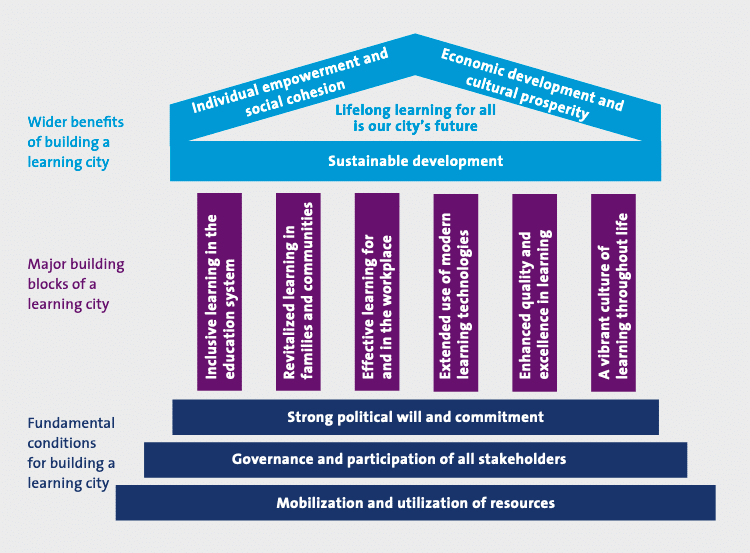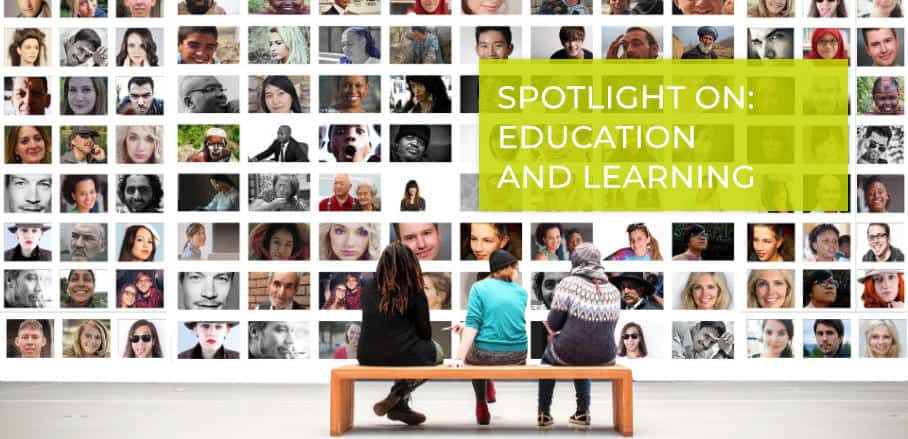Global Citizenship Education – A Local Topic?
Teaching and learning global citizenship may be a powerful answer to some of the most pressing challenges of our time. But how can cities approach this in their policies? Michelle Diederichs and Werner Wintersteiner on the potential of ‘local’ Global Citizenship Education.
“Where we practice citizenship, is in our cities and communities and this is also the place where we construe our relationship to the wider world” – Osler and Starkey. Global Citizenship and Education are both topics that many of us may not initially connect to urban development or policies. However, GCED may be quite local in the end.
What is GCED?
Global Citizenship Education (GCED) is both a pedagogical philosophy and a practice based on the awareness that faced with today’s global threats and opportunities, we as humans form an earthly community and share the same destiny with each other and with all other living beings. Thus, GCED concerns itself with teaching global solidarity among humans, global citizenship, as well as solidarity with all non-human life, planetary citizenship. GCED should not only be taught in schools but is learnt in informal and non-formal settings and is relevant to people of all ages.
After all, we adults are responsible for the future of next generations. We are the ones acting now. Thus, we must learn how to behave in ways that neither endanger our planet nor enhance predominant structures of power and unjust practices.
The Global is Local: Glocalism
Urban environments and local communities, in general, are important contexts to consider when it comes to GCED. First, local governments are naturally closest to people and therefore have enormous potential to engage people and enhance citizenship in their community. Second, globalisation has clearly created fluidity between global and local dimensions. This is what scholars call “glocalism”. It is the result of migration, new technology and information exchange as well as practices of global corporations, among other factors. For all these reasons cities are, third, more likely to overcome their “methodological nationalism”, the tendency to see all issues through a national lens. Finally, global challenges such as the consequences of climate change, inequalities, poverty, or conflict, which GCED aims to address, remain entirely local in the end. It is in our cities and communities where these challenges become visible and where they can and should be addressed.
As a matter of fact, cities play already a steadily growing role in international economies, politics, and culture. They are developing a “paradiplomacy” to complement (and sometimes counterbalance) national diplomacy and foreign policy. Think on the twin-town movement, on associations like Cities for a Nuclear Free Europe (CNFE), Local Governments for Sustainability (ICLEI), United Cities and Local Governments (UCLG), or the Cities Climate Leadership Group (C40). In 2016, even a Global Parliament of Mayors was founded. Thus, cities offer rich fields of activity to global citizens.
We Learn Where We Live: Where GCED Takes Place
We learn where we live, and this is also where we act. Looking at cities from an educational perspective, we can see that we must move away from the belief that education takes place mainly in schools, which in many countries are handled by national or state-level authorities. We must recognise cities and local communities as meaningful spaces for education and learning.
In a single day, we move within multiple environments: from home and family to the workplace, the library or sports clubs, to a local community organisation or even a virtual global community. All of these are places of learning and places where education can take place. And not only that: these are also the places where we apply our knowledge and skills, it’s where we act. Cities therefore not only present places of learning but places where learning and practice come together.
Learning Cities – a Framework for GCED Implementation
So how could GCED be integrated into local policies? The concept of ‘learning cities’ presents us with an excellent opportunity, as it aims to enhance education and learning for all ages in cities and regions. Following developments on learning cities around the world, UNESCO has developed a framework of key features for learning cities that recognises the importance of different local cultures and conditions. This framework demonstrates a suitable implementation framework for GCED.
UNESCO defines a learning city as a city that effectively mobilises its resources in every sector to:
- promote inclusive learning from basic to higher education;
- revitalise learning in families and communities;
- facilitate learning for and in the workplace;
- extend the use of modern learning technologies;
- enhance quality and excellence in learning; and
- foster a culture of learning throughout life.
Learning cities are built on political will and commitment, good governance, and involvement of all stakeholders in the process as well as the mobilisation of resources.

Framework of the Key Features of Learning Cities © UNESCO Institute for Lifelong Learning
What Could GCED Look Like in Your City?
I would like to take you on a little journey of imagination on what a learning city strategy to enhance GCED in your city could look like. The key is commitment and joint action. Your city government commits to become a successful learning city with a focus on GCED. All residents and sectors of society are represented at the planning table and are given the opportunity to influence decision-making. By engaging in creating a strategy for GCED in your city, stakeholders become aware of the concept and learn about its contents: the first learning experience takes place. Not only that, but this will also lead to meaningful action as all parties commit to making their own unique contribution to the strategy.
Contributions can be as diverse as your city is! They could come from kindergartens that establish, celebrate, and recognise various international days. It could be a library establishing a reading circle with a focus on books on unjust consumption and production. It could be a youth club that provides a platform for youth from different backgrounds to come together and share their ideologies, beliefs, and perspectives with each other, allowing for better intercultural and interreligious awareness, as Citizen Culture in Sri Lanka shows us. Likewise, it could be local companies developing an employee training programme that addresses aspects of sustainable lifestyles and production systems. It could also be a playground or other public space, where citizens are confronted with climate change and disasters that may also hit their own city.
In many countries, adult education and community learning centres play a central role in the development of learning cities and could offer a diversity of programmes and activities for the local community. Just play this further and imagine, what a joint strategy could look like if everyone contributes a piece! But of course, this is not only a journey of imagination. There are already many cities that successfully pursue the concept of a learning city and that have also integrated Global Citizenship Education within their strategies.
To sum it all up: ‘Do your little bit of good where you are; it’s those little bits of good put together that overwhelm the world.’ – Desmond Tutu (In remembrance and recognition, † 26 December 2021)
